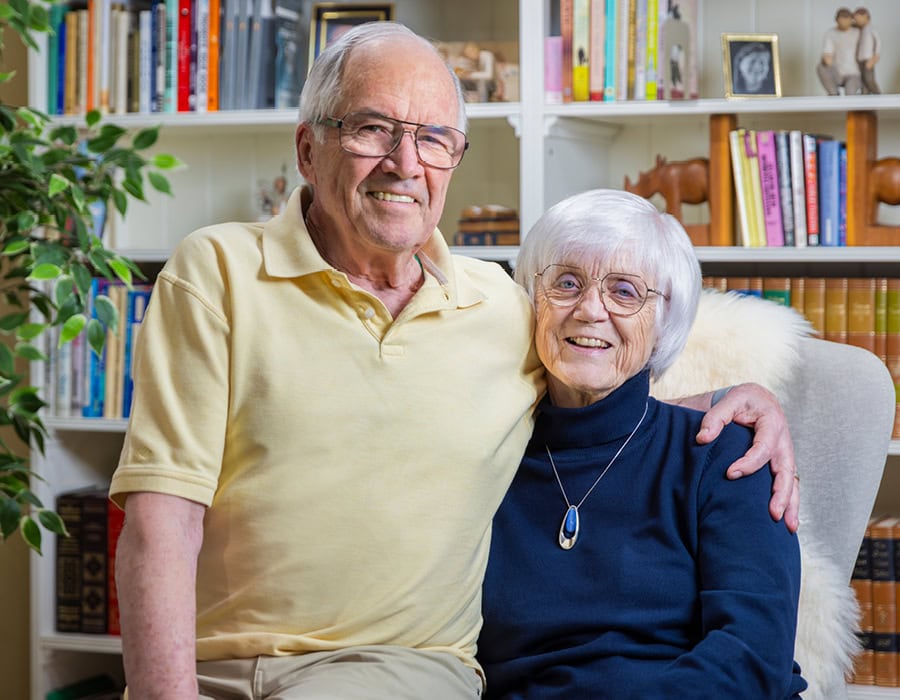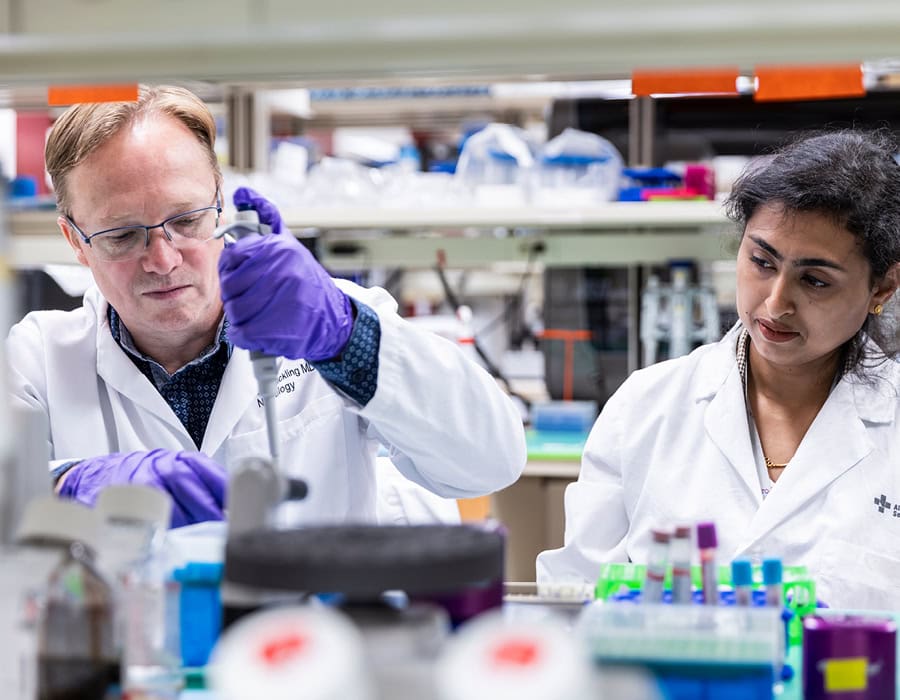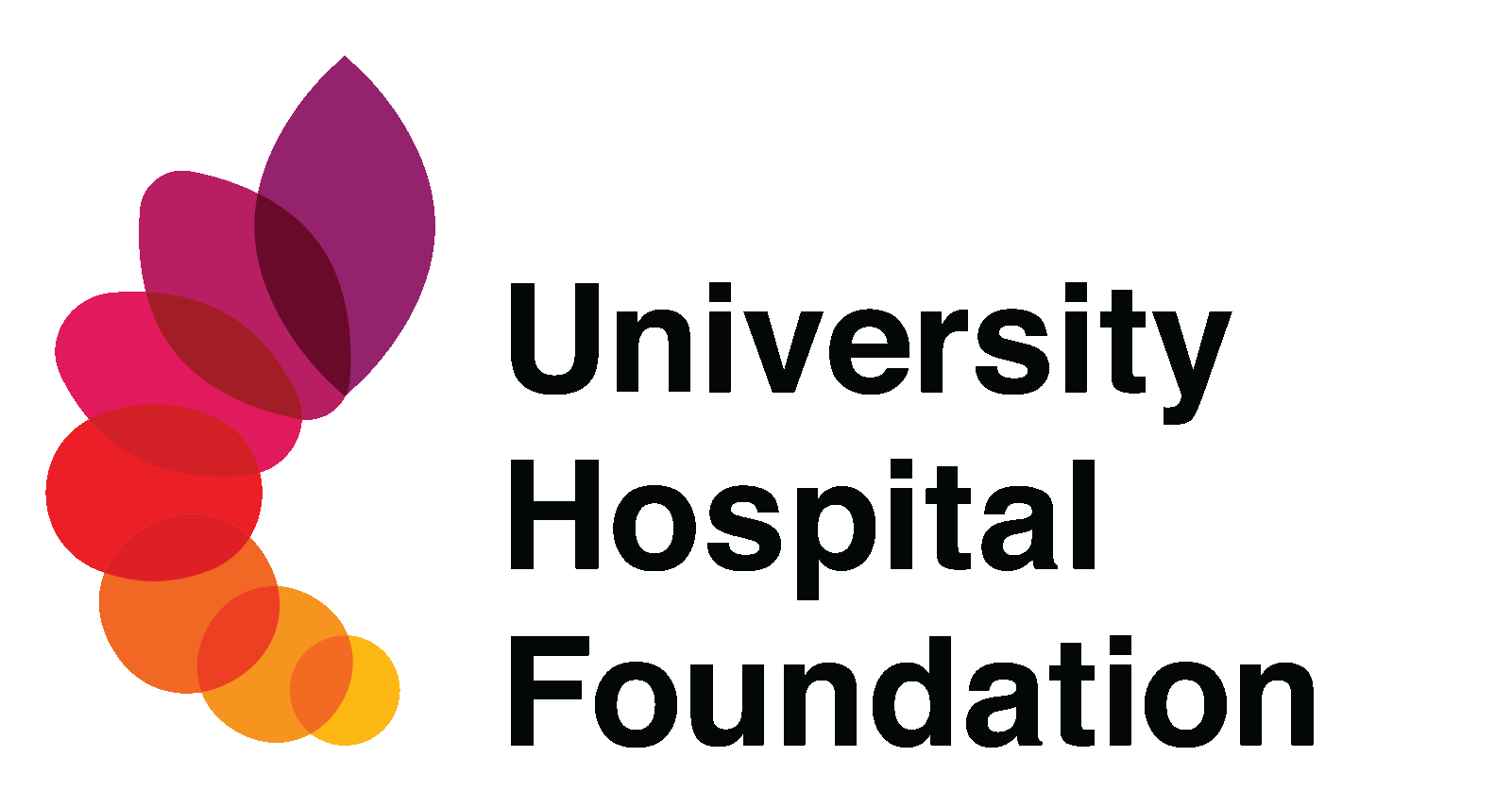Innovation in stroke care is saving lives, but donor support is vital
Ronna Jevne is grateful for the advanced care available at the University of Alberta Hospital
On an otherwise uneventful morning, Ronna Jevne, 76, stepped into the shower to get ready for an appointment. She washed her hair. Then something happened.
There was no pain, but she couldn’t figure out how to turn off the shower, which struck her as odd since she had done it many times before. “I knew something was wrong,” said Ronna. “But I wasn’t scared. I was very calm.”
She slumped to the floor of the shower but managed to pull herself to her feet with a pull bar. Then she stumbled out of the shower and down the short hallway to the bedroom and her husband, Hal. “I didn’t call out,” said Ronna. “Little did I know I couldn’t call out.”
“I recognized right away she was struggling,” said Hal. “I didn’t spend anytime thinking, ‘Could this be a problem? Could it not be a problem?’ I knew it was a problem. All my energy went to solving it immediately. I called 911.”
Within 15 minutes, the University of Alberta Hospital’s (UAH) stroke ambulance arrived on the scene. Equipped with its own CT scanner, lab equipment and video and audio communication technology, Canada’s only stroke ambulance can significantly reduce stroke-to-treatment time by collecting critical data long before the patient arrives at the hospital.

Ronna Jevne, right, and her husband Hal are thankful for the timely, life-saving care that she received from the University of Alberta Hospital’s stroke ambulance after suffering a stroke in her Edmonton home.
If necessary, the clot-busting drug tPA may be administered by a stroke specialist who is part of the ambulance crew, upon consent from a neurologist at the UAH, based on a review of the data, including images.
For Ronna, the arrival of the stroke ambulance meant receiving the clot-busting medication within an hour of her stroke. She was released from the hospital four days later and has made a full recovery.
I am grateful for so many things. The stroke ambulance, the competence and care of the team, and for the fact that even though our system is under so many stressors, I got the help I needed in a timely way.
Ronna Jevne
Donors to the University Hospital Foundation have played an invaluable role in elevating all areas of care at the UAH, including stroke care.
From supporting all aspects of the stroke ambulance – from initial concept and design to implementation and funding research on its effectiveness – to adding a second angiography suite where neuroradiologists perform image-guided endovascular thrombectomies (clot-retrieval procedures) to remove blood clots impeding blood flow to a stroke patient’s brain, community support has brought some of the most innovative and effective stroke care in the world to Edmonton.
“Our donors have supported advancements in stroke care like their lives depend on it,” said Dr. Jodi Abbott, President and CEO of the University Hospital Foundation. “And for some of them, unfortunately, that has literally been the case. Innovation saves lives, but it doesn’t come without cost. Our donors know that and have stepped up to the plate time and time again to ensure stroke care at the University of Alberta Hospital is the best it can possibly be.”

Through the REDI Stroke project, Dr. Jickling’s team has already developed rapid blood tests that will help doctors quickly identify stroke patients in the moment and choose the right treatment. Although work continues to decide how to produce and distribute the tests, they will be designed to save valuable minutes during emergencies — ensuring more patients get the right care, right away.
That includes research. Dr. Glen Jickling, a neurologist and researcher at the University of Alberta, is developing a blood test that will add speed and accuracy to the pressing challenge of diagnosing strokes. “My research is looking at how we can diagnose strokes better and quicker to get people to treatment faster,” said Dr. Jickling. “A blood test that’s usable in an ambulance or an emergency department, especially in areas outside major urban centres where they may not have access to CT scanners or even stroke expertise, would be a very valuable tool to have.”
Within minutes of administering the blood test, medical teams would know whether the patient should go immediately to the nearest hospital or if it’s not a stroke at all.
“More than half the patients we evaluate for strokes are actually experiencing something else, like a headache or a seizure or even fainting. So, if you’re out of town and you’re having an acute stroke, you need a helicopter to get you to Edmonton. But if it turns out that it isn’t a stroke, that’s a heavy use of resources and a huge disruption in the person’s life that could have been avoided.”
Dr. Jickling is also conducting research involving the aftermath of strokes. “We’re looking at people who have already had a stroke to determine what we can do to prevent complications for them down the road. What are the best treatment options?”
The timeline for Dr. Jickling’s work will be guided by the research itself. “Hopefully within a few years we’ll be running trials on the blood test in clinical settings. That’s the critical aspect to this. It may work in a lab, but it must be reliable in real time and in real settings.”
Ronna Jevne is living proof that the efforts of clinicians, researchers and the specialized stroke ambulance team are well worth it.
“I wouldn’t be here without them.
Change lives today
Your support of the University Hospital Foundation is changing lives today and tomorrow, supporting a future in which you and your loved ones live longer, healthier lives.
Donate Now
Facebook
Twitter
LinkedIn
